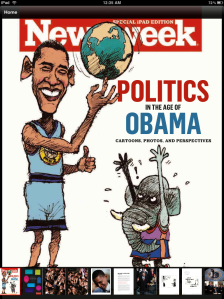
A lot of news organizations already know what “crowdsourcing” is. Some have already started using it. However, a new real-time crowdsourcing project is making news gathering take a new turn. “Alive.in” knows how!
“Alive.in” is a project launched by international news startup Small World News. The startup’s team is using a group of Arabic translators to crowdsource the translation of the real-time messages left on @speak2tweet, a service launched by Google and Twitter during the Jan. 25 revolution in Egypt, allowing callers to tweet by calling one of three numbers and leaving a voicemail.
Founded by American journalist and media specialist Brian Conley, the project first started with crowdsourcing the Egyptian revolution news. When Conley learned about Google’s collaboration with Twitter, he thought it’s time to put this service at a stronger use through Small World News, which he co-founded in 2005. The goal, according to the project’s website, is “to reach a wider audience.”
He then contacted Steve Wyshywaniuk, co-founder of the startup, and told him about Google’s new technology. “It hit him instantly that with the number of translators we’re connected to, he could assemble a team to help translate the calls,” Wyshywaniuk told ReadWriteWeb.
Conley then started reaching out to Arabic translators via Twitter, reported RWW. He then created a Google Docs spreadsheet from which they could collaborate on transcribing the messages and then translating them from Arabic to English, Spanish and German.
And that’s how “Alive in Egypt” started.
Today, “Alive.in” has expanded and is now covering Iraq, Libya and Bahrain. Citizens of those countries are contributing with real-time photos, calls, videos and tweets, reaching out to the worldwide audience.
The new project has taken news gathering into an even more advanced path, thanks to the technology and the creativity of journalists and media enthusiasts like Conley, Wyshywaniuk and their hard-working team. Today, mainstream media outlets needs to rethink their strategy and apply new technologies at best use so that they survive and provide their audience with more up-to-date news.
—
Note: The team of “Alive.in” encourage those interested in helping translate the messages they crowdsource by emailing translate@alive.in. Those interested in being involved with the project can contact @BaghdadBrian or @SmallWorldNews on Twitter.
(بالعربية)






